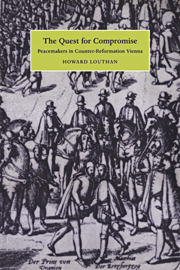Book contents
- Frontmatter
- Contents
- List of illustrations
- Acknowledgments
- A political and cultural chronology
- List of abbreviations
- Introduction
- PART I THE EMERGENCE OF AN IRENIC COURT
- PART II MAXIMILIAN II AND THE HIGH POINT OF IRENICISM
- PART III THE FAILURE OF IRENICISM
- Introduction
- 7 Confessional ambiguity and unambiguous critics: religion and the Austrian middle way
- 8 The funeral of Maximilian II: struggling for the soul of central Europe
- 9 Matthias in the Netherlands: the political failure of irenicism
- Conclusion: Storm clouds on the horizon: from the great milk war to the Thirty Years War
- Epilogue: The wider circle of irenicism
- Select bibliography
- Index
- CAMBRIDGE STUDIES IN EARLY MODERN HISTORY
Introduction
Published online by Cambridge University Press: 03 December 2009
- Frontmatter
- Contents
- List of illustrations
- Acknowledgments
- A political and cultural chronology
- List of abbreviations
- Introduction
- PART I THE EMERGENCE OF AN IRENIC COURT
- PART II MAXIMILIAN II AND THE HIGH POINT OF IRENICISM
- PART III THE FAILURE OF IRENICISM
- Introduction
- 7 Confessional ambiguity and unambiguous critics: religion and the Austrian middle way
- 8 The funeral of Maximilian II: struggling for the soul of central Europe
- 9 Matthias in the Netherlands: the political failure of irenicism
- Conclusion: Storm clouds on the horizon: from the great milk war to the Thirty Years War
- Epilogue: The wider circle of irenicism
- Select bibliography
- Index
- CAMBRIDGE STUDIES IN EARLY MODERN HISTORY
Summary
Vienna's irenic courtiers stood apart from another cast of characters who had a different agenda for the imperial lands. As the Jesuits moved into central Europe, they employed a well-defined strategy to win back the populace for the mother church. From art and architecture to pedagogical instruction the Society of Jesus devised an effective program to convert their target audience. The humanist circle in Vienna did share a common set of values and ideals, but they did not conceive a coordinated plan to steer the Empire on a middle course. The contrast between these two groups helps explain the ultimate failure of irenicism, the general theme of this closing section. To chart the slow progress of the Catholic counter-offensive as it affected the Austrian territories, however, goes far beyond the scope of this study. Our focus will remain on irenicism as we consider its weaknesses, identify its critics and analyze its breakdown in the context of the imperial court.
Though it may not be appropriate to characterize irenicism as a comprehensive agenda advocated by a well-organized faction at court, there was a central element that united the work of all the individuals we have discussed. Religion provided the critical bond of cohesion. Irenicism was in part a movement of reaction directed against the growth of confessionalism. It eluded the narrow demands of dogma and offered a peaceful alternative to a divided Empire. In their own fashion Strada, Crato, Blotius and Schwendi articulated this vision. Religion, however, also helped keep this phenomenon a defensive and marginalized movement. It was both a weakness of the irenicists and a rallying point for those antagonistic to policies of moderation and compromise.
- Type
- Chapter
- Information
- The Quest for CompromisePeacemakers in Counter-Reformation Vienna, pp. 123Publisher: Cambridge University PressPrint publication year: 1997



